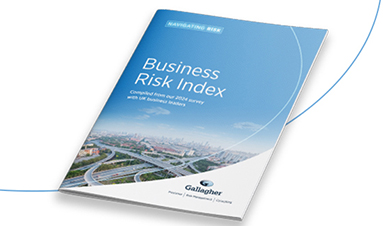An analysis of the most pressing concerns based on insights from 1,000 UK business leaders.

As part of a study led by European Regions Airlines Association (ERA), the in-house analytics function of Gallagher's specialist global aerospace division scrutinised data from more than 135,000 flights occurring in 2018 to accurately quantify the impact of EU261 compensation claims on regional airlines.
This is the law relating to flight compensation, initially introduced in 2004, intended to enhance and enforce the rights of passengers subjected to delays, cancellations and denied boarding. Across each EU261 compensation bracket*, Gallagher’s analysis of claims payments incurred by airlines for flight cancellations and delays of more than three hours, reveals they are exceeding revenues made on a given flight by two if not three-fold:
- For flights up to 1,500km - where delayed passengers are eligible for €250 compensation - average compensation is 275.46% more than the revenue made on a single flight.
- For flights between 1,500km - 3,500km, where delayed passengers are eligible for €400 compensation, average compensation exceeds revenues by 304.49%.
- At the upper threshold of €600, for flights over 3500km, average compensation is 214.12% higher than revenues.
On average, EU261/2004 compensation incurred is at 275.9% more than the ticket price. Across all bands of compensation, this equates to a €2.59 penalty for every €1 of revenue made on claimable flights.
In real terms, this can mean that airlines which have experienced a delay on a high-frequency route must run subsequent flights on time for at least another two to three rotations before the cost of EU261 is covered. Many regional airlines, including the carriers within this analysis, typically operate more high-frequency short-haul routes, which tend to be less lucrative than long-haul operations. As a result, EU261 compensation is imposing a disproportionate financial burden when it comes to revenue versus incurred costs.
Commenting on the study findings, Peter Elson, CEO of Gallagher’s specialist global aerospace division, said:
“As risk advisers to the aerospace industry, few issues concern us more than the rising burden of EU 261/2004 for regional airlines across Europe. In the current landscape, airlines are already tackling rising costs across a number of fronts – volatile fuel costs, crippling Air Passenger Duty and an endless list of taxes - which in combination leave little in the way of margins. Add to these costs vastly disproportionate penalties for late and cancelled flights and many carriers are struggling to break even. “Regional airlines have a unique service offering in Europe and many local communities rely heavily on their services. Paying three times the ticket price for a cancellation wipes out revenue many times over, threatening the ability of regional airlines to cover their costs on any given route.”
To preserve Europe’s regional airline industry, ERA, in collaboration with Gallagher, Baines & Simmons and Clyde & Co, recommends that:
- Operators with an annual passenger load of 2.5 million or less in the preceding year should be subject to reduced compensation of 50 per cent.
- Complete exoneration from compensation on PSO routes, subsidised or regulated, to avoid reduction of connectivity.
- A cap on the liability towards passengers limited to the proportion of the airfare that the operator bears (that is, compensation per flight and not per journey).
- Extraordinary circumstances should account not just for the one flight directly affected but for the whole flight programme for the day to acknowledge the knock-on effect on subsequent flights.
- Complete exoneration if delays or cancellations arise for any safety related reason (in line with the recently approved Canadian regulation).
- To allow the airline enough time to perform all the necessary operational checks, the time threshold should be extended from three to five hours.
- The regulation should provide that an airline incurring costs and expenses as a result of the application of the regulation may not be prevented from recovering such costs and expenses by any contractual provision excluding or limiting liability.


